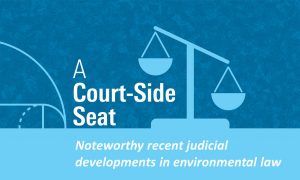 Pillsbury—the first global law firm to launch a practice team dedicated to all things hydrogen—has again demonstrated its position at the forefront of the ongoing energy transition by launching the only public resource tracking the development of hydrogen projects worldwide. This valuable resource is accessible at www.TheHydrogenMap.com.
Pillsbury—the first global law firm to launch a practice team dedicated to all things hydrogen—has again demonstrated its position at the forefront of the ongoing energy transition by launching the only public resource tracking the development of hydrogen projects worldwide. This valuable resource is accessible at www.TheHydrogenMap.com.
Articles Posted in Energy
Environmental Justice Legislation Update
Environmental Justice, as an urgent priority of the Federal Government, dates back to 1994, and President Clinton’s issuance of Executive Order 12898. This order directed federal agencies to identify and address, as appropriate, the disproportionately high and adverse human health and environment effects of its many programs, policies and procedures on minority populations and low-income populations. The primary legal basis for this order was Title VI of the Civil Rights Act of 1964, in particular, Sections 601 and 602, which prohibit discrimination in programs and activities receiving federal financial aid and assistance. Over the years, the Supreme Court has reviewed the scope and importance of Title VI. In Alexander v. Sandoval, decided in 2001, the Court concluded that while private parties could sue to enforce Section 601 or its implementing regulations, as written, Section 601 only prohibits intentional discrimination. Noting that disproportionate impact is not the sole touchstone of invidious racial discrimination. Moreover, the Court also ruled in Sandoval that private parties cannot sue to enforce regulations implementing Section 602. Perhaps as an acknowledgement of these shortcomings, the Environmental Protection Agency (EPA) has established an administrative system to process environmental justice complaints at 40 CFR Part 7. Without strengthening the statutory base of environmental justice, the program may continue to be the subject of countless symposiums and seminars. However, this may change soon.
Hydrogen Powers Its Way from Proof of Concept to Reality in Real Estate
 Hydrogen is the new buzzword in every industry, and real estate is no exception. Hydrogen does not emit carbon dioxide when burnt and could therefore help reduce the climate impact of buildings, which in aggregate represent one of the biggest emitters of greenhouse gases after industry and surface transport. To the extent that hydrogen is to become an important power source globally, it will need to enter the domestic power market. The first step appears to be the development of pilot villages.
Hydrogen is the new buzzword in every industry, and real estate is no exception. Hydrogen does not emit carbon dioxide when burnt and could therefore help reduce the climate impact of buildings, which in aggregate represent one of the biggest emitters of greenhouse gases after industry and surface transport. To the extent that hydrogen is to become an important power source globally, it will need to enter the domestic power market. The first step appears to be the development of pilot villages.
Carbon Emissions and the NYC Climate Mobilization Act
The Climate Mobilization Act constitutes a profound shift in the regulation of commercial real estate in New York City—and all stakeholders including building owners, investors, sellers and purchasers, tenants, and lenders will need to consider how to quantify and allocate the costs of compliance (or non-compliance). In “Sustainable Buildings and Development: Carbon Emissions and the Recent Climate Mobilization Act of New York City“, colleagues Caroline A. Harcourt and Sheila McCafferty Harvey, discuss the potential impact of the newly enacted Climate Mobilization Act (CMA or the Act) for developers and building owners, tenants and lenders operating or underwriting loans in New York City.
EU Green Deal: the European Commission releases a strategy to strengthen the EU’s financial market infrastructure
 On 19 January, the EC published a strategy setting out wide-ranging ideas for the development of its financial market infrastructure. The strategy includes plans for driving the green transition in line with the European Green Deal through turning the EU financial markets into a “global green finance hub.”
On 19 January, the EC published a strategy setting out wide-ranging ideas for the development of its financial market infrastructure. The strategy includes plans for driving the green transition in line with the European Green Deal through turning the EU financial markets into a “global green finance hub.”
Join Us 02.04 for an Energy Transition Virtual Fireside Chat with Jigar Shah
Pillsbury partner and Global Co-Head of the Energy & Infrastructure Projects team Mona Dajani discusses energy transition with Jigar Shah, President and Co-Founder of Generate. Join us on February 4, 2021 where Jigar and Mona chat about entrepreneurship, sustainable sectors including hydrogen, food waste and EVs and the role of government in the energy transition. To attend this fireside chat, register here. 
Incorporating ESG into the Oil and Gas Industry
As we previously reported, the popularity of the sustainability linked loan and the green loan have snowballed in recent years. However, it’s not just the loan market that’s taking the consideration of environmental, social and governance (ESG) practices seriously. Studies show that companies are coming under pressure from all sides to adopt sustainable practices.
Hydrogen—A Key Element in the EU’s Green Planning
 Hydrogen is gaining global recognition for its potential as a key player in the energy transition. Investors and businesses are exploring opportunities across multiple sectors, including energy, manufacturing, transport and finance. According to a report by Bloomberg, the current pipeline for global hydrogen projects is worth an estimated $90 billion. The EU is not going to be left behind, with a focal point of its Green Deal being on hydrogen.
Hydrogen is gaining global recognition for its potential as a key player in the energy transition. Investors and businesses are exploring opportunities across multiple sectors, including energy, manufacturing, transport and finance. According to a report by Bloomberg, the current pipeline for global hydrogen projects is worth an estimated $90 billion. The EU is not going to be left behind, with a focal point of its Green Deal being on hydrogen.
Join Us 11.12 for an Energy Transition Virtual Fireside Chat with Paul Browning
Pillsbury partner and Global Co-Head of the Energy & Infrastructure Projects team, Mona Dajani, talks #ChangeInPower with Paul Browning, President and CEO of Mitsubishi Power Americas.
Join us on November 12, 2020, for a 45-minute conversation, where Mona and Paul discuss the power sector’s role in the energy transition, the growing prominence of hydrogen and energy storage, collaborating with customers and stakeholders and setting a path toward a decarbonization of the power grid.
To attend this exclusive fireside chat, register here.
 Gravel2Gavel Construction & Real Estate Law Blog
Gravel2Gavel Construction & Real Estate Law Blog




